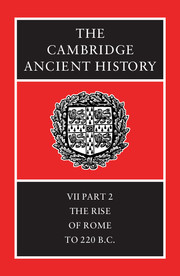Book contents
- Frontmatter
- 1 The Sources for Early Roman History
- 2 Archaic Rome Between Latium and Etruria
- 3 The origins of Rome
- 4 Rome in the fifth century I: the social and economic framework
- 5 Rome in the fifth century II: the citizen community
- 6 Rome and Latium to 390 B.C.
- 7 The recovery of Rome
- 8 The conquest of Italy
- 9 Rome and Italy in the early third century
- 10 Pyrrhus
- 11 Carthage and Rome
- 12 Religion in Republican Rome
- Appendix
- Chronological Table
- BIBLIOGRAPHY
- Index
- Fig. 50:The city of Rome in the early third century b.c.
- Map 11: The western Mediterranean in the third century
- References
12 - Religion in Republican Rome
Published online by Cambridge University Press: 28 March 2008
- Frontmatter
- 1 The Sources for Early Roman History
- 2 Archaic Rome Between Latium and Etruria
- 3 The origins of Rome
- 4 Rome in the fifth century I: the social and economic framework
- 5 Rome in the fifth century II: the citizen community
- 6 Rome and Latium to 390 B.C.
- 7 The recovery of Rome
- 8 The conquest of Italy
- 9 Rome and Italy in the early third century
- 10 Pyrrhus
- 11 Carthage and Rome
- 12 Religion in Republican Rome
- Appendix
- Chronological Table
- BIBLIOGRAPHY
- Index
- Fig. 50:The city of Rome in the early third century b.c.
- Map 11: The western Mediterranean in the third century
- References
Summary
SOURCES AND METHODS
The first question to be asked in this chapter is whether the attempt to discuss Roman religion before about 200 B.C. can be justified at all. There are good reasons for doubting whether it can; but the position that will be argued here is that, despite the necessary limitations on our understanding of the Romans’ religious life, it is possible to establish enough about its structure and working to say something, in very general terms at least, about the relation of religion to society (II, III, IV) and to examine the phenomena of religious change and adaptation within the system (V, VI). The purpose of this introduction is, however, more negative: it is to challenge the validity of the established versions of the ‘history’ of Roman religion and to show why any new attempt at writing such a history would produce no more than another arbitrary synthesis. Any treatment of the subject must begin from a radical re-assessment of the evidence we have and of the possibilities it offers.
The fundamental problem can be stated very simply: the great bulk of the sources we have for early Roman religion derives from historians and antiquarians who lived in the very late Republic or early Principate, two centuries or more after the end of the period with which this chapter is concerned. It must be very doubtful whether these writers had any understanding of the nature of early republican religion, beyond what they could guess or extrapolate from their knowledge of the recent past.
Keywords
- Type
- Chapter
- Information
- The Cambridge Ancient History , pp. 573 - 624Publisher: Cambridge University PressPrint publication year: 1990
References
- 29
- Cited by

